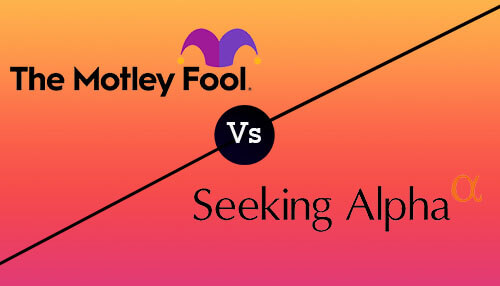The Motley Fool and Seeking Alpha are two websites that provide stock updates, research, and analysis, making it simple to trade and invest like a pro. The Internet is a wealth of information. Seeking Alpha and Motley Fool can both be helpful if you’re searching for stock recommendations, ETF investment opportunities, or general retirement or investing strategies.
Even at a cursory glance at their respective homepages, both websites are distinct, even though they target audiences in the same area. This Motley Fool vs. Seeking Alpha review will show you which of these tools is better for your analysis.
| Motley Fool is best for: | Seeking Alpha is best for |
| Individuals drawn to semi-active trading. | Swing traders |
| For new investors who prefer to choose individual stocks over exchange-traded funds (ETFs) or mutual funds. | Skillful investors who place a high priority on fundamental analysis. |
| Long-term investors seeking to buy stocks that will outperform the market. | Active investors and intraday traders who enjoy the benefits of the market-moving publications throughout the day.
|
For various categories of investors, Motley Fool and Seeking Alpha both provide trustworthy services. Both companies publish a ton of market analysis and stock suggestion columns.
Despite having different strategies, they both have a long history of integrity and excellent analysis for traders. Both have affordable price tags compared to specialized newsletters targeted at specific professions or markets. Each also provides additional features. Let’s explore the similarities and contrasts between Motley Fool and Seeking Alpha.
| Motley Fool | Seeking Alpha | |
| Subscription | From $199 to $2,999 annually | $250 to $2,400 annually |
| Best for | Both novice and seasoned investors | Both novice and seasoned investors |
| Offers | Click here! | 14-day free trial |
Motley Fool vs. Seeking Alpha: Determining Factors
Seeking Alpha, the younger of the two, was founded in 2004. The site takes a unique approach to stock recommendations. Former Wall Street analyst David Jackson, the company’s founder, recognized a gap in buy-side analysis.
Until then, most publicly available research was produced by sell-side experts such as investment banks, who frequently had no stake in the outcome and would not suffer if their suggestions were poor.
The Motley Fool, one of the first websites offering investment advice, was started by Tom and David Gardner in 1993. Both brothers are still in charge of the business today.
They managed to secure content collaboration with AOL early in the days when the internet began and gained access to a sizable audience for their work, which started as a straightforward investment newsletter. Later, the business relocated to this present domain, where it has been producing company evaluations, investing manuals, plus several other investment guidance ever since. Ad revenue was also very crucial to The Motley Fool.
Seeking Alpha and The Motley Fool are excellent at serving their respective target audiences because they are very aware of who they are. The various packages offered by The Motley Fool may be suitable for you if you are a beginner investor and want to outperform market returns over the long term.
Seeking Alpha provides access to the minds of experts that are unmatched by other services if you are an investor who desires to manage your portfolio actively and constantly enhance your investing methods.
Factor 1: Cost
The premium services Motley Fool offers come in various packages based on different “themes.” Such as real estate, retirement, or technology-specific portfolios. The Motley Fool SA, costing $199 per year, is their most well-known service. This portfolio is built around 15 top-notch stocks that need to be invested for not less than five years.
Seeking Alpha, in contrast, charges fees in a three-tiered system.
Free Plan: With the free options, you can view various analyses and set alerts for any new analysis on your favorite stocks.
Premium Plan: The Seeking Alpha Premium Plan, which costs $19.99 per month when billed annually, must be purchased to view author statistics.
Pro Plan: The last option is the Pro Plan, which costs $199.99 per month when paid annually. The plan is intended for professional investors, as the name suggests.
Factor 2: Customer Services
Because their products are more interactive, customers will probably engage with The Motley Fool more. The way Seeking Alpha provides its services is very hands-off.
Any questions you might have can be answered in The Motley Fool’s FAQ section.
Additionally, the help center offers comprehensive tutorials that walk users through using their products.
To help new users navigate the website and tools, Seeking Alpha also offers a sizable help section. Since the Seeking Alpha website has many features, many FAQs are technical.
In contrast to The Motley Fool, Seeking Alpha has a discussion board where users can post questions categorized by topic.
Get Started With Motley Fool
Motley Fool vs. Seeking Alpha: The Final Word
Both Motley Fool and Seeking Alpha offer various investment-related products. The former primarily provides stock selection services.
Seeking Alpha gives you complete control over decision-making by providing high-quality financial data on various businesses. While Seeking Alpha is best suited for active investors, Motley Fool’s products are designed for long-term buyers.



